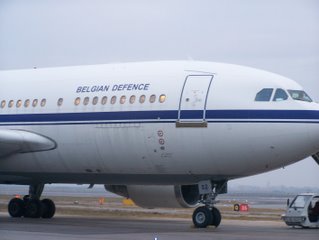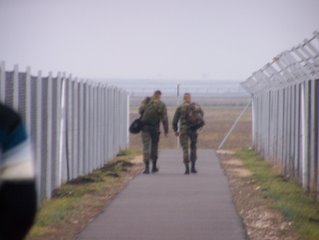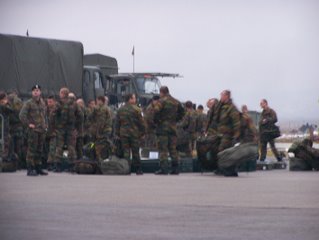45 minutes in Kosovo
 So...why did I got to Kosovo?
So...why did I got to Kosovo?
I'm taking a class that deals with the European Union and issues of security. My teacher is Mme. Anne-Marie Lizin, President of the Belgian Senate and rapporteur of the OSCE Parliamentary Assembly. When she found out that Belgian peacekeepers were headed to Kosovo to relieve troops that were finishing their 4 month tour of duty, and since our assignment for the class is to publish a book on European reactions to the war in Kosovo, she jumped on the occasion to bring us along to speak to some of the heads of operations in the country. It was incredibly last-minute, but it was an offer I could not refuse. The UN mission in Kosovo (UNMIK) began in 1999, and is to date the largest mission ever attempted. Its mandate at the time was not only to end the conflict and establish security so that the hundreds of thousands of Albanian refugees could return to their homes, but also to rebuild a nation completely destroyed by clashes between Serbs and Albanians and the NATO bombing campaigns. Currently, the European Union, the OSCE, the UN and NATO are all present on the ground, and are all in charge of very specific tasks. The NATO peacekeeping mission, KFOR, includes contributions from 35 nations. KFOR is responsible for establishing and maintaining a secure environment throughout the country.
The UN mission in Kosovo (UNMIK) began in 1999, and is to date the largest mission ever attempted. Its mandate at the time was not only to end the conflict and establish security so that the hundreds of thousands of Albanian refugees could return to their homes, but also to rebuild a nation completely destroyed by clashes between Serbs and Albanians and the NATO bombing campaigns. Currently, the European Union, the OSCE, the UN and NATO are all present on the ground, and are all in charge of very specific tasks. The NATO peacekeeping mission, KFOR, includes contributions from 35 nations. KFOR is responsible for establishing and maintaining a secure environment throughout the country.
On the way to Pristina, we were in the plane with about 100 Belgian troops set to start a 4-month tour of duty in and around Mitrovica - generally considered the most difficult area since most of the country's Serbs (who make up less than 10% of Kosovo's population) reside there. The people we talked to, both commanders and soldiers, said that Albanians and Serbs rarely mix anymore, but that any small event could potentially spark new hostilities.
The event in question that could reignite the conflict will likely occur at the beginning of 2007 when the UN envoy for Kosovo, Martti Ahtisaari, is expected to publish his recommendations on the status of Kosovo. He has already delayed publication once out of fear that his suggestion that Serbia lose Kosovo would help extreme nationalists come to power in the Serbian elections scheduled for January 21st. He came to this conclusion after being unable to reach an agreement in talks between the Serbs and the Albanians. This means that the troops we travelled with on our way to Pristina may have a very difficult 4 months ahead of them. Not only do they have to deal with a long winter, but they may find themselves in the middle of new skirmishes, as Albanians start to demand full independence and Serbs forcefully try to maintain control over Kosovo.
Because of security delays in Belgium, our time at the Pristina army base was limited, but we did get to speak to a UN representative on the ground, who laid out the main issues currently on the table in the area. As with anything that happens in its former backyard, Russia is especially interested in Mr. Ahtisaari's recommendations. The Russians aren't favourable to the idea of an independent Kosovo, but they may promise not to veto the UN resolution if they can get what they want in the Caucasus - no doubt related to the separatist movements in South-Ossetia and Abkhazia which they have been supporting on and off since Yeltsin's days.
On our way back, we were in the plane with about 60 Belgian peacekeepers who were heading home. We got a chance to speak to some of them about their impressions of their mission. In general, they are very well received by the population. The situation is calm, but that is because Serbs and Albanians stay away from each other, apart from a few small enclaves. Because we only spoke to members of the Belgian forces, they could only tell us what is going on in the North of Kosovo. They didn't have much to say when we asked them about certain secret American detention centres in the East... While Kosovo is calm right now, it will be interesting to see what happens when the UN report is finally released. And just because it is calm does not mean that life is much better. Electricity and water is unavailable more often than not, even in the better parts of the capital. Human and arms trafficking are huge problems, and international forces are unable to crack down because it is not in their mandate. And while people don't like to admit it, the presence of large numbers of troops in the country inevitably allow mafia-run prostitution rings to survive. Supply and demand...the only thing I remember from two semesters of Econ.
While Kosovo is calm right now, it will be interesting to see what happens when the UN report is finally released. And just because it is calm does not mean that life is much better. Electricity and water is unavailable more often than not, even in the better parts of the capital. Human and arms trafficking are huge problems, and international forces are unable to crack down because it is not in their mandate. And while people don't like to admit it, the presence of large numbers of troops in the country inevitably allow mafia-run prostitution rings to survive. Supply and demand...the only thing I remember from two semesters of Econ.
So there you have it, my relatively short and concise recap of a very complicated situation: if you made it to the end of this huge post, you get a treat next time I see you!


4 Comments:
Will you marry me Muffetti???? Sounds awesome!
I want my treat!
Send it to India!
xox
Justice
Ya! treats! it wasn't that hard to read that, it is interesting afterall, i mean how many others get to do that?
I have to agree with your friends- that was fairly painless reading, and I don't think I deserve any treats. I guess I know which blog to read now when I can't decide if I want updates on Kosovo or good bands passing through Paris.
Probably tough to tell in only 45 minutes, but what would you say to my Serbian-Croation roomate's claims that Kosovo has nowehere near the capacity to form a functioning state if independence is granted? (He is generally pretty objective because he hates Serb nationalism and Kosovo nationalism and pretty much every nationalism except maybe for Jamaican nationalism becasue he's a pretty big reggae fan)
Enregistrer un commentaire
<< Home